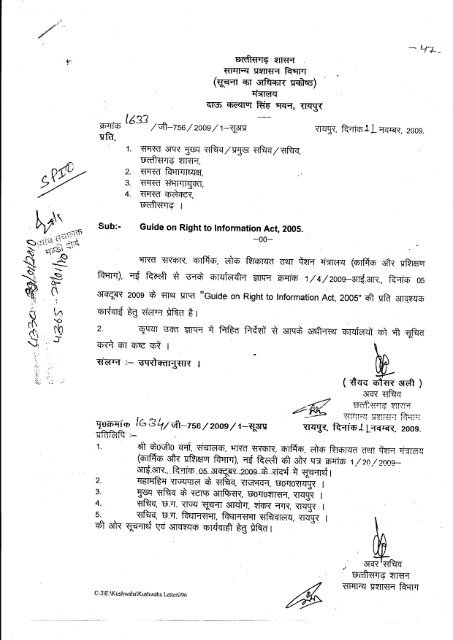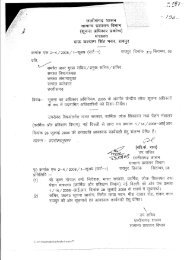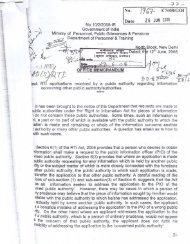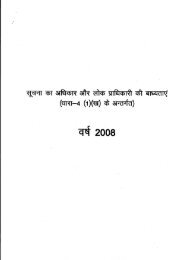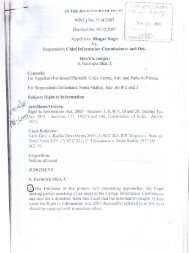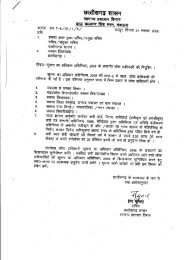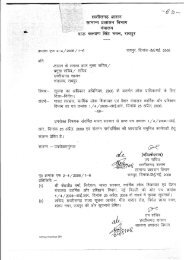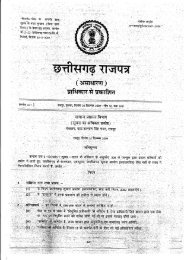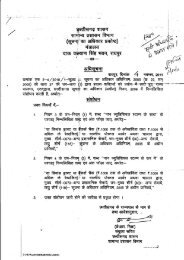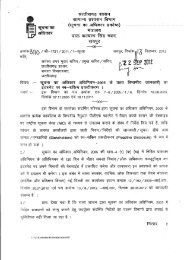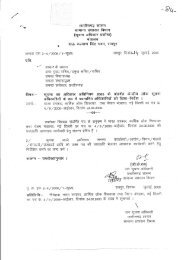sn" - CG State Information Commission
sn" - CG State Information Commission
sn" - CG State Information Commission
You also want an ePaper? Increase the reach of your titles
YUMPU automatically turns print PDFs into web optimized ePapers that Google loves.
*- Ltztr[,]\'Y .n.'.i{',&Q'.-;'d *).".2'nN' o.f*t *'rt .Osssn"fi' V$,ffi:'lilJ'|t:::.: ...:i.'.:':.lzt'tVUger+fctrq:ft,/gI_756/ 2Oo9 / 1_q3[qEffiffitrq elru;T11rrn€T stflRrq frqrrT(qq-qr o'r qlf+'rc qdrs)rt{KrqEI\F EF-eTrur R q*q, {rqg{' 1. q'rt{d sTcR gcq gE-q/q5qq efu-qrrqaq,E-d=qq-€ yrrcFi,2. qrtw frqr.ing&T,3. TfiIW TilliTligffi,4. lTstw Erd-{er,s-d=grTd ISiub:- Guide on Right to tnformattolfr, 2005.2. evql B-fr HIErr q frtrd ftffi tori or tne of Iq'dr{ :- g(rttsil-ilTl{ |tTqgi, k{6f I qcFR, 2ooe.srTq-d oreftrreT srqffi ar) fi qfuf,\(dqqRcT-n)srw T{fuq^'4rr:*rr-rr= !TFr=vryb :.r-'rrr,-',.; A.-\.!!.:l'Y x
2+-6. A "public authority" is any authority or body or institution of setf government establishedor constituted by or under the Constitution; or by any other law made by the Parliament or a<strong>State</strong> Legislature; or by notification issued or order made by the Central Government or a <strong>State</strong>Government. The bodies owned, controlled or substantially financed by the Central Governmentor a <strong>State</strong> Government and non-Government organisations substantially financed by the CentralGovernment or a <strong>State</strong> Government also fall within the definition of public authority. Thefinancing of the body or the NGO by the Government may be direct or indirect.Public lnformation Officer.*-ignatedsomeofitsofficersasPubliclnformationofficer.They are responsible to give information to a person who seeks information under the RII Act.Assi-stant Public lnformation Officer'r,,8. These are the officers at sub-divisional level to whom a person can give his RTIapplication or appeal. These officers send the application or appeal to the Public lnfonnationOfficer of the public authority or the concerned appellate authority. An Assistant Publiclnformation Officerf lotresOonsible to supply the information.9. The Assistant Public lnformation Officers appointed by the Department of Posts invarious post offices are working as Assistant Public lnformation Officers for all the publicauthorities underthe Government of lndia.Riqht to lnformation under the Act10. A citizen has a right to seek such information from a public authority which is held by thepublic authority or which is held under its conirol. This right includes inspection of work,documents and records; taking notes, extracts or certified copies of documenls or records; andtaking certified samples of material held by the public authority or held under the control of thepublic authority. lt is important to note that only such information can be supplied under the Actwhich already exists and is held by the public authority or held under lhe control of the publicauthority. The Public lnformation Officer is not supposed to create information, or to interpretinformation; or to solve the problems raised by the applicants; or to furnish replies tolrr raalhaliaalar raolianot l-!vvll lVaav--.r LtUvlrllvl tr". ..-.,..l,l:, ..I l. I rle r1(:I glveli ure (;[tzelts a ilgnt tu il||()ilnalron at Par wrrri llre MgJlrugl$ ol r'alrratnell! arluthe L4embers of Stale ! egls-lalrres. A-ccordlng to the Act, lhe inforrnelron whict't:dennot Lredenie'4 t+ the Parliament or- a <strong>State</strong>- Leglslalure, s,.ha!! not be denled ta any person.12. A citizen has a right to obtain information fiom a public authority in the form oJ diskeltes,floppies, tapesrvideocassettes or-in-any-sther-electronic mode or thrcrugh print-outS providedsuch information is already stored in a computer or in any other device from which theinformation may be e-mailed or transferred to diskettes etc.13. The information to the applicant should ordinarily be provided in the form in which it issought. Howeyer, if the supply of information sought in a particular form woulddisproportionately divert the resources of the public authority or may cause harm to the safiety orpreservation of the records, suppty of information in that form may be denied.14. ln some cases, the applicants expect the Public lnfotmation Officer to give information insome particular proforma devised by them on the plea that they have a right to get information
(\ ^r'/-t.>qulDECI'l$ RIGHT TO INFORMATmruacT,2005Part IFOR ALLSTAKE r-to !_pERqThe right tc information is implicitly guaranteed by the Constitution. However, with aview to set out a practical regime for securing information, the lndian Parliament enacted thelight to lnformation Act, 2005 and thus gave a powerful tool to the citizens to get informationfrom the Government as a matter of right. This law is very comprehensive and co'vers almost allmatters of governance and has the widest possible reach, being applicable to Government at alllevels- union, state and Local as well as recipients of government grants.2 The Act requires the Government to compile a guide in easily comprehensible form andto update it from time to time. The Government has aiready published four guides in the past,one each for the information seekers, the public authoritiei, the Central Fublic lnformationfficels and the Appellate Authorities. Here is an updated consolidated guide for the use of allstake-holders. This guide conlains five parts. Part I of the guide discusse! some aspects of theAct which all the stake-holder are required to know. Rest of the four parts are specificallyrelevant to the public authorities, the information seekers, the public information officers and thifirst appellate authorities respectively.3. Contents of this guide are specifically relevant in relation to the Central Government butare equally applicable to the Slate Governments except in relation to rules about payment of feeor deciding of appeals by the lnformation <strong>Commission</strong>s. lt may be noted that t'his guide usesthe term Public lnformalion Officer in place of Central Public information Officer/Siate punliclnformation Officer. Likewise Assistant Public lnformation Officer has been used for CentralAssistant Public lnformation Officer/<strong>State</strong> Assistant Public lnformation Officer and lnformation<strong>Commission</strong> for Central lnformation <strong>Commission</strong>/<strong>State</strong> lnformation <strong>Commission</strong> except where itwas considered necessary to make specific reference to the Central Public lnformationOfflcer/Central lnformation <strong>Commission</strong> etc. The Departmentai Appellate Authority has beenreferred to as First Appellate Authority inasmuch as the first appeal lies with him.''' A ' Th- h^cir :'rh!=-tf nf fhe P!--ht fr- !:1f,.^+*+a!----- ti,--+ !- +--- :!a-- --:!::., . .i .'=sattl: ulire. iit iiiij, t\.iui:i. i,ij iiiictiiiaii-:l AEi tS {U Si-llpofr-€i i.ale Ciiizeng, pioilloie*.5nqn-risnarr an-i qrrw qvi,vu,rlauiiiiyaaaa. r^rAirii:3.. :- .a\^ ..,^-t-i-- -i a!^- a\ _..^ _ _-":,':Y:':ilvyiir itic woi-Kiilg OI Ine \rOvemmei1ir C0t-tiaiti r-:olrUpitOn, anCi :.nakg,' 9u-id,e.fTociaiv woik foi ihe peopie in reai sense. ii goes witiioui saying ihat an iniormeci ciiizen, ",is'betl€r equipped to keeo necessary vigil on thelnsinrmenls of go-vern?nce ancf nnak-e the''government'more addouritdb-le to tne-go-verned. The Acfis-a Oidstep iowari" r"r.i"g it;citizens informed about the activities of the Government.What is lnformation5. lnformation is any material in any form. lt includes records, documents, memos, e-mails,opinions, advices, press releases, circulars, orders, logbooks, contracts, reports, papers,samples, models, data material held in any electronic form. lt also includes information'refltingprivate!obody which-"nycan be accessed by the public authority under any law for lhe timebeing in force.'
1'- in the forrn in wlrictr it is sought. lt need be noted that the provision in the Act simply meansthat if the inforrnation is sougnt in the form. of nr'otolopy, it shallbe provided in the form ofphotocopy, or if it is sought in-the form of u noppv, it srr"il;" prcvided in'that form subject to theconditions given in the Act- lt does not mean tirii tne plo sharl re-shape the infonnation. Thisis subslantiated by the definition of the term 'right to information'as given litne Act, accordingto which, it includes right to obtaining informatiin in tne rrrm of diskettes, fft>ppies, tapes, yideocassettes or in any other electroniC mode or through print-outs provided such infonnation isalready stored in a computer or in any other device. iv6ry*r,ere in the Act, the word,form, hasbeen used to represent this meaning.28' '15' Some lnformation Seekers request the Public lnformation officers to cull out informationfrom some document(s) and give such extracteo intormaiil;1ffi;',;;H.;;as a right ro get'material' from a public autholity which il hglo bt ;; il;r the control of that pubtic authority.The Act, however, does not require the Public rirornration officer to deduce some conclusionfrom the 'material' and supply the 'conclusion' so deduced to the applicanl. lt means that thePublic lnformation officer is iequired to supply tre maierial' in the"forrrr""r,.u by the publicauthoritv, but not to do researcA on ueiralt'otin" "itiruii. d;;;;; ;;yt#;'l;"m the materiatand then supply it to him.16. The RTI Act has over+iding effect vis_d_vis other laws inaqmuch as the provisions of theRTI Act would have ef{ect notwfhstanoing anytning-in"on"i"tent therewith contained in theofficial secrets Act, 1923, and any other liw f6r thi time ieing in force or in any instrumenthaving effect by virtue of any law ot'her than the RTI Act.17' . .The Act gives- the right to information only to the citizens of lndia. lt does not makeprovision for giving information to corporations, Aisocialions, companies etc. wnicn are legalentities/persons, but not citizens. However, ir an apliicationli nr"oi ut;;fiyeeor officebearerof .any corporation, Association, _co1nR_anv,.Nco ut". indicaling his name and suchemployee/office bearer is a citizen of ln-dia, iritorri-rliion miv ue supplied to him/her. ln suchcases, it would be presumed that a citizen has sought ilfcrmation at the address of theCorporation etc.Fee fof Seekinq lnformation18. A pgfSOn Who desires tO Seek SOnne lnfcrnneti::n f:.nm = n;;!-.tir ;;:t!:;..13.. :.- -^_..:-^j -_send, along with the application, a demand draft or"r,"ntor,."n;;; ^. ;';:;;:^'=-:.:j:'X:-,1Yr)I ryS !!lr- tHllnAAC fanl narzatrl^ l^ 4L- A ---. .-.. - '...'e'',' rv Urtz ,,tuuuulllti '"slev,c\Jfltcerprescribedof tne publicforseekingauthcri$ as.'feginformaiion. The navmentnf fee nan aren ha *--r^ !-.....^.. -t ---,- ! .:Accounts officer of the pubtic aurhor*v oit" *.," ,qi"il;i;;"; ;:T::-:,::l-,?]:_"'::yj1t1pfopef feCeipt."rrv'rrrstrvrr \JrrlLEl irgillll$[19' The applicant.may 3b9 q9 required.to.pay further fee towards the cost of providing theinforrnation, details of which shall be ihtimateo toin_" apili"affiA;pli; "Iprl."riu*d by theRight to lnformation (Regulation of Fee and cost) nr',rJ5, iobs. Rates of fee as prescribed inthe Rules are given below:(a) rupees two (Rs. 2r-) for each page ( T 4-4or A-3 size paper) created(b)oractualcopied;charge or cost price of a copy in rarger sii.-fa-$r]i(c)-.Factual cost or price for samples or'moOetsi'--''(d) for information provided in diskette or floppy, rupees fifu (Rs.50/-) per diskette or floppy;
?9_(e) for information provided in printed form, at the price fixed for such publication orrupees two per page of photocopy for extracts from the publication. ."20. As already pointed out, a citizen has a right to inspect the records of a public authority.For inspection of iecords, the public auttrority shall charge no fee for the first hour' But a fee ofrupees five (Rs.5/-) for each subsequent hour (or fraction thereof) shall be charged-21. lf the applicant belongs lo below poverty line (BPL) category, he is not required to payany fee. However, he should submit a proof in sitpport of his claim to belong to the belowpoverty line. The application not accornpanied by the prescribed fee of Rs'10/- or proof of theapplicint's belonging to below poverty line, as the case.may be, shall not be a valid applicationunder the Act. lt may be pointed out that there is nri bar on the public authority to supplyinformation in responje to such applications. However, provisions of Act would not apply tosuch casesForrnat of ApplicationZZ. Tlrere is no prescribed format of application for seeking information. The application canbe made on plain paper. The application should, however, have the name and complete postaladdress of tire applicant. Even-in cases where the information is sought electronically' theapplication should contain name and postal address of the applicant.,,t,,i.l; ,23. The information seeker is not required to give reasons for seeking information-24. Sub-section (1) of section 8 and section 9 of the Act enumerate the types of informationwhich is exempt'from disclosure. Sub-section (2) of section 8, however' Provides thatinformation exempted under sub-section (1) or exempted under the official Secrets Act' 1923can be disclosed if public interest in disclosure overweighs the harm to the protected inleresl'25.The information which, in normal course, is exempt from disclosure under sub-section(1) o1'Section B of the nct, wouiO cease to be exempted if 20 years have laps;ed aftet occunence 01'.;the incidentto which the information relates. l-iow-euer, the following types of information would.ilti;-;;any citizen-* .*"r"pt and there would be no obligation, even after lapse of 20 years, to give26. The Act does not require the public authorities to retain records for indefinite period' Therecords need be retained as per the record retention schedule applicable lo the concernedpublic authority. tnfoimation generated in a file may survive in the form of an OM or a letter or inany other form even after testruction of the file/record. Section S(3) of the Act require'sfumisning of information so available after the lapse of20 years even if such infomration wasexempt fiom disclosure under sub-section(1) of Section 8.
--J-6:"Assistance Available to the Applicant27-lf a person is unable to make a request in writing, he may seek the help of the publiclnformation Officer to write his application and the Public lnformation Officer should render himreasonable assistance. Where a decision is taken io give access lo a sbns,orily disabled personto any docurnent, the Public lnformation Officer, shall provide such assistance to the person asmay be appropriate for inspection.28.1n normal course, information to an applicant shall be supiltied within 30 days from thereceipt of application by the public authority. lf information sought concerns the tife or liberty ofa person, it shall be supplied within 48 hours. ln case the application is sent through theAssistant Public lnformation Officer or it is sent to a wrong public authority, five days shall beadded to the period of thirty days or 48 hours, as the cetse may be. Further details in tfris regardare given in the chapter, 'For the Public lnformation Officers.'Appeals29.1f an applicant is not supplied information within the prescribed tirne of thirty days or 48hours, as the case may be, or is not satisfied with the information furnished to him, he may'prefer an appeal to thg first appellate authority who is an officer senior in rank to the Pubfitlnformation Officer. Stith an appeal, should be filed within a period of thirty days from the dateon which the limit of 30 days of supply of information is expired or from the date on which theinformation or decision of the Public lnformation Officer is received. The appellate authority of,the public authority shall dispose of the appeal within a period of thirty days or in exceptionatcases within 45 days of the receipt of the appeal.',,30.lf the first appellate authority fails to pass an order on the appeal within the prescribed periodor if the appellant is not satisfied with the order of the first appellate authority, he may prefer asecond appeal with the Central lnformation <strong>Commission</strong> within ninety days from the date onwhich the decision should have been made by the first appellate authority or was actuallyreceived by the appellant.c"-p!a*fg., , 31- lf any person is unable to submit a request to a Public lnformation Officer either byl5a4--,-LL--L--- -g:-----t--- -.-.- -:.-: - .t !.isaolt.i.ulqr ouvtr irtr uilrLEr rictD ilr^ ut;cil apPurilrt'u uy ins uunugrllc}u puollc aurnonly; or lng''.. ... -: .-.. .n*-i-+-^+ DlhiiF t*t^*^U^- r-riSirar lra* *^i'-^i;-^^^^^+ L;^ -- L-- ^--!;.-r_,J_, . . ,:reerslqrt. I 'uvtrv rrrturrrrelrvll vllr9el lloJ lglu0gu r\, cll',rrE'l"lt l.ilD Lrl llglf auPllt.;allull (rl a(rf rHal ll-Jlthe sanre io the P-ublic lnformetion Officer cr the appellate auihority, as the case may., , I . .1 forwarding: , , . be; oi i'ie i-ras been refuseci access io any infoi-nraiion requesteci by hirn uncier ihe itTi aci, or,r:1;: i.,'.;.;;,,' .:::l:h9 paE noi:,been given a response io a request tbr intormation within the time limit specified in: :;1.:, .;:' ".,,,,,,.r,,ih9., Act; pr he has been required to pay an amount of fee which he considers unreasonable;'.ior:: 'he belier-res that he haS been clrren-ihcdnnrilet-4. hnislearlinn n:.f:!eo infr::,nr::t!nn hr r=- -^r-^ ^- I r'll *-l'*.:. "'-u'i'r'Yrvti'riervquirrv !i igrggrt9 vqta illq^g q'rirvrir,srlaviircomplaint:to the lnformation <strong>Commission</strong>.Disposal of Appeals and Complgints bv theJOlg32. The Central lnformation Cornmission decides the appeals and complaints and conveys itsdecision to the appellanUcomplainant and first appellate authority/ Public lnformation Officer.The <strong>Commission</strong> may decide an appeal/complaint afier hearing the parties to theappeal/complaint or by inspection of documents produced by the appellanUcomplainant andPublic lnformation Officer or such senior officer of the public authorig r,rrho decided the firstappeal. lf the Cominission chooses to hear the parties before deciding the appeal or thecomplaint, the <strong>Commission</strong> will inform the date of hearing to the appellant or tle complainant at
3/-Ieast seven clear days before the date of hearing. The appilllanUcomplainant has thtjdiscretion to be present in person or through his authorized representative at the time of hearingor not to be Present.Third Partv I nformation33. Third party in relation to the Act means a person other than the citizen who has maderequest for iniormation. The definition of third parg includes a public authority other than thepuUtic authority to whom the request has been made'Disglosure of Third Partv lnftrrmationg4. lnformation including commercial confidence, trade secrd.ts or intellectual property,-thedisclosure of which would harm the position of d tnlrd party,"otp"titir".isexempt fromdisclosure- Such information should not be disclosed unless the competent authority is s.atistieOthat larger public interest warrants the disctosure of such information':'-35.1n regard to a third pafi infonnation which the third party has treated as co-nfidential, thepublic lnformation Officer should follow the procedure as given in the chapter 'FOR PUBLICtNFoRMATtoN oFFiCERS'. The third parry'shoutd be givJn full opportunity to put his case fornon-disclosure if he desires that tlre infotmation should not be disclosed''':::**:.1,,i*':.-'."t
Part llFOR PUBLIC AUTFIORITIESPl-Public authoritie-s are the repository of information which the citizens have a right to haveunder the Right to lnformation Act, 2oi)5. The Act "r"i"irportant obligations on pubticauthorities so as to facilitate the citizens of the country to atcess the infprmation held undertheir control. The obligations of a public authority are nasicaliy tre oOtigations of the head of theauthorlty, who shculd ensure that these are mit in iigrrt eainest. R-eference made to publicauthority in this document is, in fact, a reference to the head of the public adhority.2' Proper management of records is.of utmost importance for effective implemenlation ofthe provisions of the Act. A public authority should, tnerefore, rnaintain alf its records properly,It should ensure that the records are duly iatalogued and indexed in such a manner and formthat it may facilitate the right to information. -Suo Motu Disclosure3' Every public authority should provide as much information suo motu to the publicthrough various meansbf communications so that the public have minimum need to use the Actto obtain information. rnternet_ being one of the most effective means of gommunications, rheinformation may be posted on the website.4' Section 4(1Xb) of the Acl, in particular, requires every public authority to publishfollowing sixteen categories of information:(!) the particulars of its organisation, functions and duties;q!) the powers and duties of its officers andemployees;(iii) the procedure foilowed in the decision making iro"u"s,including channers of supervision and accountibirity;(iv) the norms set by it for the discharge of its functions;..,.,,.{u)., 'regulations, ,.,1h*.rules'instruction!, manuals and records, hefd by it or under its"' control or used by its employees for discharging its functions;. t"'t(v0 a statement of the categories of documentsinai are held by ii or under its control;iit;:\ . iha n=riinr.i=r+ ri-^!,rL-!-F,nE^--r-.-1E--! ri rcrt E ---:-a- ri'ts '- rur uo. ltsuil.iluon w[n, Or represenlationrr"'/;:: vti t:::: rrrE r!:=!!l:..=t='-r: :Jj_:"t_.":'.-j'Y:,',,:,,.ilae pusJ!!'.; In reiaiio;i to tiie ioiTi'iijiaiiurr aif iis nniinrr nrimplementaiion ihereof;q eiqlsiii.trii iJi Itrlt u|-icluii, Guuliuiis, comi-fiinggs ancj omgr bocligs consistino of two'f'.:t:l r -a-t------! -r rr. . i .;. . :1"'-:!:r"persons consiiiuieci as iis part or for the purpose of ib advice, aid as to--.+.t-1":-;.--.*ir;-16{heOubliC::Orihgrninutes-nf-irr-h-maatinoc cra 6^^^6-;}r!^ J++ +..r+!i-.: ,': -., .",:".: .:: : ,. e.v svvvggrgrg,;" ,lvl yuullv,(tX) ''. 'directory of its officers and employees;(x) the monthly remuneration received by each of its officers and employees, includingthe system of compensation as provided in its regurations;(x0 the budget allocated to each of .itsagency, ind'icating the particulars of att ptans,proposed expenditures and reports on disbursements made;'(xi\ the manner of execulion of subsioy programmes, including the amounts allocatedand the details of beneficiaries of suitr programmes;(xii| particulars of recipients of concessions, peimits or authorisations grantefl by it;(xiv) details in respect of the information, availabte to or held by it,reduEeJ in an electronicform;
-.13.t,...r j(xv) the particulars of facilities available to citizens for olrtaining information,including the working hours of a library or reading room, if maintdined f6r public use;(xvi) the names, designations and other particulars oflne Pubtic tnformation Officers.5. Besides the categories_ of information enumerated above, the Governrnent mayprescribe other categories of information to be published by any public eruthority. lt need bestressed that publication of the information as referred to abbve is'not opfional. d is a statutoryrequirement which every public authority is bound to meet.6. Another important point to note is that it is not sufficient to publish the above informationonce. The public authority is obliged to update such information every year. lt is advisable that,as far as possible, the information should be updated as and when any development takespla9e.-Particularly, in case of publication on the internet, the information should be keptupdated allthe time.7 - The public authority should widely disseminate the information. Dissemination shouldbe done in such form and manner which is easily accessible to the public. lt may be donethrough notice boards, newspapers, pubtic announcements, rnedia broarlcasl, the irrternet orany other means. The public authority should take into consideration the cost effectiveness,.local language and most effective method of communication in fire local area whiledissem inating the inforqration8. Public authorities formulate policies and take various decisions from time to time. Asprovided in the Act, while formulating important policies or announcing the decisions affectingthe public, the public authority should publish all relevant facts about such policies anldecisions for the information of public at large.Providins Reasons for DecisionsI'The public authorities take various administrative and quasi-judicial decisions whichaffect the interests of certain persons. lt is rnandatory for the concemed public authority toprovide reasons for such decisions to the affected persons. lt may be done Uy uiingappropriate mode of communication.10' Every pubiic authority is reuuired to designaie Public lnformation Officers in"all theadministrative units or offices undei it. Every puntic euthorlty is etsa :-equired te desianaleAssistant Public lnformation Officers at each sub-.divisional levei. the co'veinment of lnOii naidecided that Centrat Assislant Public lnformation Officers (CAplOs)"ppoint"O;; th"Depai-u-neiri of-PosFwouidaei-as-eAPirgsioralithe-pu'oiic-aritnoritir. uncier tn" aouonft"i ;;lndia.DesioinatioJ o_f Apoellate Authoritv11- Sub'-section (S) oJ Section 7 of the RTI Act provides that where a request for informationis rejected, the Public lnformation Officer shall, inter-atia, communicale the particulars of theAppellate Aulhority to the person making the request. Thus, the applicant is informed about theparticulars of the {pp.qttet: Authortty wt_e-n a request for information'is rejected but there may becases where'the Public lnforrnation Officer does not reject the applicition, but'the appliiantdoes not receive a decision within the time as specified in ttre Act'or he is aggrieved by thedecision of the Public lnformation Officer. ln such a case the applicant may tikiio exercise his
- -?+:::1 .,.t;:.:L.::ir::!tji:i.114, r..::f:;-::+.n.r ::r:,j tr-r:l;.right to appeal. But in absence of the particulars of the appellate authority, theapplicant may facedifficulty in making an appeal. All the.public authorities should, therefore,designale the First Appellate Authorities and publish their particulars alongt^iith the particulars ofthe Public lnformation Officers.Acceptance of.Fee12. According to the Right to lnformation (Regulation of Fee and Cost) Rules, 2005 asamended by the Right to lnformation (Regulalion of Fee and Cost) Rules, 2006, an applicantcan make payment of fee in cash or by demand draft or banker's cheque or lndian Postal Orderpayable to the Accounls Officer of the public authority. The public authority should ensure thatpayment by any of the above modes is not denied or the applicant is not compelled to draw IPOetc. in the hame of any officer other than the Accounts Officer. .lf any public authority does nothave any Accounts Officer, it should designate an officer as such for the purpose'of receivingfee under the RTI Act or rulds made thereunderCompliance of the Orders of the lnformation <strong>Commission</strong>13. While deciding an appeal, the lnformation Comrnission, may require the concernedpublic authority to take such sleps as may be necessary to secure compliance with theprovisions of the Act. ln this regard the <strong>Commission</strong> may pass an order to provide information toan applicant in a particular form; appoint a Public lnformation Officer; publish certain inforrirationor categories of infonnation; make necessary changes to its practices in relation to themaintenance, management and destruction of records; enhance the provision of trainingj for itsofficials; provide an annual report as prepared in'compliance with clause (b) of subsection (1) ofsection 4 of the Act.14. The <strong>Commission</strong> has power to pass orders requiring a public authority to compensaGthe complainant for any-loss or other detriment suffered by him. ll also has power to impbsepenalty on the Public lnformation Officer as provided in the Act. lt rnay be noted that penalty isimposed on the Public lnformation-Officer which is to be paid by him. However,..thecompensation, ordered by the <strong>Commission</strong> to be paid to an applicant would have to be paid bythe public authority,15. ,- The decisions of lhe <strong>Commission</strong> are binding. The public authority should ensure that,-,:t,',thg,gdeiSrpessedlby,the <strong>Commission</strong> are implemented- lf any:public aqthority or a PlO.is of:.i,.,,::':;t'he fidini'lhiit an oider of the Gommission is not in consonance'with the pr:ovisions of the Act, it''t"y,"pproach the High Court by way of a Writ Petition.Greation of Gentral Point17. Sub-section (1) of Section 5 of the Right to lnformation Act, 2005 mandates all publicauthoritieS to desighate as many Fublic lnformation Officers as necessary to provide informationunder the Act. Where a public authority designates more than one Public lnformation Officerl0
_39-appropriate Public lnfonfidtiofi(PlO), an applicant is likely to facg,difficulty in approachin-g_lh.bmc"r. The applicants would also face problem in identifying the officer senior in rank to thePublic lnformation Officento whom an appeal under suFsection (1) of Sec{ion 19 of the Act canbe made. Therefore all public authorities with more than one PIO should create a central pjintwithin the organisation where all the RTI applications and the appeals.addressed to the FhstAppellate Auihorities may be received. An officer should be made responsible to ensure that allthe RTI applications/appeals received at the central point are sent to the concerned Publiclnformation Officers/Appellate Authorities, on the same day-Transfer of Apolications14. The Act provides that if an application is made to a public authority requesting for aninformation, which is held by another public authority: or the subject matter of which.is q9r9ctosely connected with the functions oi another public authority, the public auth6fty,,.$ryhicnsuch ipplication is made, shatltransfer the application or reievant part of it to that othfffiublicauthoriiy within five days frorn the receipt of the applicati-on- The. public authority fttqyldsensitize its officers aOout this provision of the Act lest the public authority is held responsiblefor delay.Annual Report of the CIC19. The lnformation <strong>Commission</strong>s, after the end of each year, ale required to preparereports on the imptenentation of the provisions of the Act {uring that year. Each MiniStry orDepartment is requir&, in relation to the public authorities,within its jurisdictiol to collect andprwide information to the concerned lnformation <strong>Commission</strong> for preparatiqn of the report. Theieport of the.<strong>Commission</strong>, inter-alia, contains following information in respgcl of the year.townlcn the report relates-(a)the number of requests made to each public authority;iOj tne nu.Gr of 'decbions where applicqnts were not entitled to access to thedocuments pursuant to the requests, the provisions of the Act under which thesedecisions were made and the numbelof tirnes such provisions were invoked;(c,l particulars of any disciptinary action taken against any officer in respect of the.r:,::::.,:€dTinistratign,oftheAgt'j.'.:!.: /^:I-rt-^ .h* . t;.r. ;I al,irn^o'ti^ili^+or{ hrr oqr.h nr thlir. :' , (e) the:amount of charges-collected by each public authority undei the Act; and. lqgohformitt wrth,the Actl qf:;;,;':.: ,.i11,,any fact'$ Which.ihOlCatg.an.';effort:,by',th'e.,public: authorities to':almi4isJer 1l
- 3(-_Part.lllFOR |TFORMAT|ON SEEKERSA cilizen who desires to obtain any information under the Act, should make anapplication to the Public lnformation orn"ui of the con"emeo public authority in writing inEnglish or,Hindi or in the official language of the area in which ih" ;pp6;li;n'is made. Theapplication should be precise and splcific. He should make payment of application fee at thetime.of.submitting the application as prescribed in the Fee Rutes" The applicant can send theapplication by post or tlrrough electronic means or can deliver it personalti ln ine omce of theplblic authority' The application can also be sent through an Assistant public tnformationOfficer.2' The applicant s.hor:ld make application to the concerned public authority. lt is advisedlhat he should make alr efforts to ascertain,as to which is the pubric authority concerned with theinformation and should send application to the Public rnrormaiion officer of that public authority.3' lt is obserued that some applicants seek information in regq-ect of many subjects by wayof one application. lt creates pro6tbm for the Public lnformation oiTicer as weti"" in" applicant.The applicant should, therefore, see to it that by ;;y;f *;a-pptication, he seeks information inrespect of one subject only.Fee for Seekinq lnformation4' The applicant, along with the application, should send apptication fee to the publiclnformation officer- ln casJof Government oi rnoia pr"r.tio"o application fee is Rs. 10/- whichcan be paid through a demand draft or a banke/i ;{{;;;r-"n indian postat order payabte totheAccounts officero-f lhepublic authority..Tne. p"iin-enttt"u can atso o--e,uou by way ofcash to the Accounts.officer of the public authoritf oi to G assistant public lnformation officeragainst proper receipt.5' The applicant,tSy.alsg ?qrequired to pay further fee towards the cost of provlding theinformation, details or whicn shall be intimated to the applicanl by the public lnformation officer.The fee so dernanded can be paid the same way as apprication fee.e rr. tg rL-!! !::u
^37-period .ofthirly days from the date on which the limit of 30 dayq of supply of informatior,expired or from the date on which the information or decision of tfie public iniormation Officer r.received- The appellate authority of the publjc authority shall dispo"" of tfru.appear within aperiod of thirty days or in exceptional cases within +5 days of the receipt or t-nu gilfju"l.' -lf the appellate authority fails.to.pass an order on the appeal within the prescribed periodor if the appellant is not satisfied with the order of the Rrst appellate authority,-n" rrv prefer asecond appeal with the lnformation <strong>Commission</strong> within ninety'days from the dat" o"i"nUt tf,*have been made by the first*:':j:i^"nouldappellate authority or. was actuulv r."eived by theappetlant.1qThe appeal made to the Central tnformation Comrnission should contain the followinginformation: -(i)(iD(iii)(iv)(v)(vi)(v)(vi)(vii)Name and address of the appellant;Name and address of the Public lnformation Officer againsl the decision 'Ii':',: of whom theaPpeal is prefened;Particulars of the order including number, if any, against which the'appeal is prefened;Brief facts leading to the appeal;r--'-"lf the appeal is prefened against deemed refusal, particulars of the application, includingnumber and date and name bnd address of the Public lnformation biRcer to whom theapplication was made;Prayer or relief sought:Groundsfpr prayer or relief;Verification by the appellant; andAny other information, which the <strong>Commission</strong> may deem necessary for deciding theappeal.I11.t . The appeal made to the Cenfal lnformation <strong>Commission</strong> should -"- be - accompanied -'---"'' by thefollowing documents:Ia{(i)(ii)(iii)self-attesled copies of the orders or documents against which appeal is made;Copies of the documents.relierl uponby the appellant and refe#d to in the appeat; andAn index of the documents refened to in the aiieal.r' 12- A person can make a complaint to the lnformation <strong>Commission</strong> if he is unable to submit. a request to a Public lnformation C)ffice1 elther by reascn lhel s!_lch an c#icei h+= n.;,i i,=e::F :: appoinl.g 0V the concemed. public authority: or the Assistant public lnformatlg:: Off:cer t""' reltfseo !o sccept hls c:' her applicaiion or appeai foi foiwaniing ihe samego rhe pubtic' lnformation Officer oithe appellaie auihorifu. as'the case mav he. hp ^rhad. l.aen ra{rrenr!,, :1."1. ''," ':'?ccess to any information requesteO gn' nirit'*C*r tf1*-p.n i"l-; o! # h* ffi E]n ;;!."-;;,'",..;;* "1,:,-,r:;rrgSB.9nse lo a reguest,for infOrmation within the time limit snecified in the -a-ctl .r. i= l; n;-;= '':.,,. :..:::,.:::,....;t.,::..:,, 'D-€-i givt'ii trt$urrrpieie, misieaciing Of ialSe iniOfmatiOnl3
Part lVFOR PUBLIC INFORMATION OFFIICERSThe Public lnformation Officer of a public authority plays a pivotal role in making the rightof 'citizens to information a reality. The Act casts specifiiduties on him ancj makes him liable forpenalty in case of default. ll is, therefore, essential for a Public lnformation officer to study theAct carefully and understand its provisions correctly. Besides the issues discussed elsewherein this document, a Public lnformation officersnouto keep the following u.p""itin view whiledealing with the applications under the Act.2' Soon after recejving the application, the Public lnformation officer should check whetherthe applicant has made_ the payment of application fee or- *nltn"i * i;oo";;i 6; ;;;;belonging to a BelowloYutty Line (BPL) hf ltv. lf apptication is not Jd"orplnied by theprescribed fee or the BPL Certificate, it cannot beireated as an application under in" nrt Act. ltmay, however, be noted that Public lnformation Officer should consider such applicationsympathetically and try to supply information sought by way of such an application.f ra nsfe r_of e pp I icati o n3' Some times requests are made to a public authority for information which do not concernthat public authority or only a part of wtrich is available *itn tn" public autnority to which theapplication is made and-.remaining or whole of the information concerns another public authorityior many other public authorities.4' Section 6(1) of the RTI Act, 2005 provides that a person who desires to obtaininformationanyshall make a request to the public information officer of the concerned publicaulhority. section 6(3) provides that. wh.9re an -applicationis made io- a luuic auihorityreq.uesting for any information which is held uy anolnbi public authority or ttre slnject matterwhichofis more closely connected with the iunctions of another public authority, the publicauthority to which such an application is made, shalltransfer the application to that other publicauthority- The provisions of sub.section (1) and sub-section(3) of Section 6, suggest that theAct requires an information seeker to address the application to the public lnformation officerof the 'concerned pubiic authori$'. Hovr,ever, there may be cases in which a personprudenceof ordinarymay believe lhat the information sought bl, him,rher.,vculd be a.*:ai!=hi; wiii, i!,.,- r.rrl:iir.authority to which he/she has addressed the apolication but is aclrralh_r hela 1r"....*.1';;;;r'*rrr= r-rrl!=!nrrhiin 'r"r''::'- =ur;;u:::i'-arlihnritrr in :ii_sucn ar,al. a^^i^CaSeS,*a^ine --^,,---^:-'-'. appiiCani rrfai(es a bonafiCie mistake Of addieSsing theapplication to the Public lnformation Officer of a wrrrnn nrrhlir'. arrrhnrirrr r)n rh+ --4L--- L4+Jwhere an appticant addressur in" apptication t" tnu"piiil"-r-i"r#ti;;, afii#Ji''J'""?,,.authori$, which to a person of ordinarv Drudence wnrld nni ennaar rn hc, {hn ^:^::-: -:r:::"^g._Lbjic authority, the applicant does noi furni ;;;il;;#t ;ffiffiil il;"jli"i#'ilUre uuiluelneo puoilc aumonty..5' Given hereinunder are some situations which may arise in the matter and actionrequired to be taken in such cases:(i)A person makes an application to a public authority for some informalion whichconcerns sqlme another public authority. ln such a case, the public -the lnformationOfficer receiving the application should transfer the application to concernedpublic authority under intimation to the applicant. However, if the pubiic lnformationOfficer of .the.publicauthority is not ableito find out a" to'*f,i"fl puOfi. authority isconcerned with the information even after making reasonabte efforts to find outiheconcerned public authority, he should inform the ipplicant that the,information is nott4
?-A_(i'iavailable with his public authority and that he is not aware of the particulars of theconcerned public authority to which the application could be transferred. lt would,however, be the responsibility of the PlO, if an appeal is made against his decision,to establish that he made reasonable efforts to find out the particulars of theconcerned public authority.A person makes an application to a public authority for information, only a part ofwhich is available with that public authority and a part of the information concerns, some'another public authority.' ln such a case, the Public lnforrnation Officer shouldsupply the information concerning his public authority and a copy of the applicationshould be sent to that another public authority under intimation to the applicant.(iii) A person makes an application to a public authority for infornration, a part of which isavailable with that public authority and the rest bf the information is scatlered withmore than one other public authorities. ln such a case, the Public lnformdtion Officerof the public authority receiving the application should give information relating to itand advise the applicant to make separate applications to the concerned publicauthorilies for obtaining information from them. lf no part of tlre information sought, isavailable with it but is scattered with more than one other public authorities, thePublic lnformation Officer should inform the applicant that information is not availablewith the public authority and thatthe applicant should make separate applications tothe concerned public authorities for obtaining information from them. lt may be notedthat the Act requires the supply of such information only which already exists and isheld by tfie public authority or held under the control of the public authority. lt isbeyond the scope of the Act for a public authority to collect the information fromvarious public authorities to supply it to the applicant. At the same time, since theinformation is not related to any one another particular public authority, it is nOt thecase where application should be transferred under sub-section (3) of Section 6 ofthe Act. lt is pertinent to note that sub-section (3) refers to 'another public authority'and not to'other public authorities'. Use of singular form in the Act in this regard isimportant to note.(iv) lf a person makes an application to a public authority of Central Government forsome information which is the concern of a public authority under any <strong>State</strong>..:Government or the Union Territory Administration, the Public lnformation Officer of',,',;,i,4,, , :the public authority receiving the application should inforrn the applicant that theri::-.;:1fir:;t.'ii.a'.r:,r'jr::,::r,,.,,,.,,i;,,.,; . information may bg had from the concerned <strong>State</strong> GovernmenVUT Administration.',,1ai,,.:,'.,:i' ''.',.,''.''1. t Application, in such a case, need not be transferred to the <strong>State</strong> Government/UT' ,''i'JAdministration.' ,tl:*i,. '.i - ' '. , r5. : in.bilef, if tne-appiicanon is.accompanieci b-v the pi'esciibed ii:e oi iire Ferlgw f,overiv; ,:jr$j;i,,,,,.',,1r,.1,:.,, ,,,.;;lFDiigation of a part ihereof concerns some oiher public authoriiy. if the subiect maiier of ihe-*;i-.,, , ..; ,.i. lfpPlic.gtion concerns any other public authority, it should be transferrerl to that public authority.,;"i,-:,, . , ,..' , . , lf r.o..lly,a part of the application ionc,ems the other public authority, .a copy of the application rnay.:.,=i:.1.r....:_t..., . .vvit:Y!:"r.!l!v t..qt fs9i.v !u.ravr.itr v.gqitt gtr9v..t.rtV irrv usri wrtrvrr rvrqrve lv urql fuvllv sullrv.tlr'While transfening the application or sending a copy thereof, the concerned public authority" informed about the transfer of his application and the particulars of the public authority to whomthe application or a copy thereof has been sent.7. Transfer of application or part thereof, as the case may be, should be made as soon aspossible and in any case within five days from the date of receipt of the application. lf a Publiclnformation Officer transfers an application after fwe days from the receipt of the application, hewould be responsible for delay in disposal of the application to the extent of number of dayswhich he takes in transfening the application beyond 5 days.l5
B. The Public lnformation Officer of the public authority to whom. the application istransfened, should not reJuse acceptance of transfer of the application on the ground that it wasnot transferred to hirn within 5 days.9. A public authority may designate as many Public lnformation Officers for it, as it maydeem necessary. lt is possible that in a public authority with more than one Public lnformationOfficer, an application is received by the Public lnformation Officer other than the concernedPublic lnformation Officer. ln such a case, the Public lnformation Officer receiving theapplicatiari should transfer it to the concerned Public lnformation Officer imrnediately, preferablythe same day-. Time period of five'days for transfer'of the application applies only when theapplication is transferred from one public authority to another public authority and not fortransfer from one Public tnformation Officer to another in the sarne public authority.Rende-rinq Assistance to Applic??ts. 10. The RTlAct provides that the_Public lnformation Officer has a duty to render reasonableassistance to the persons seeking information. As per provisions of the Act, a person, whodesires to obtain any information is required to make a request in writing or through electronicrneans in English or Hindi or in the official language of the area in which the application is made.lf a person seeking information is not able to make such request in writing, the Publiclnformation Officer should render reasonable assistance to him to reduce the same in writing.11. Where access to a record is required to be provided to a sensorily disabled person, thePublic lnformation Officbr should provide assistance to such person to enable him lo access theinformation. He should also provide such assistance to the person as may be appropriate forthe inspection of records where such inspection is involved.-;Assistance Available to PIO12. The Public lnformation Officer may seek the issislance of any other officer as he or sheconsiders necessary for the proper discharge of his or her duties. The ofticer, whose assistanceis so sought by the Public information Officer, wculd render all assistance to him. Such anofficer shall be deemed to be a Public lnformation Officer and would be liable for contraventionof any provisions of the Act the same way as any other Public lnformation Officer. 'lt would beadvisable for the Public lnformation Officer.to inform the officer whose assistance is sought,about the above proviqion, at the time of seeking his assistance.13. Some Public lnformation Officers, on the basis of above'referred provision of the Act,'',-40., : ii 'is: the.iesponsibiiity oi ihe'officer who:is ciesignated as'tire Fubiic informatiort gi:nser$ylthe , '. '" '1 public authgrityto provide information to the applicant or reject the application for any reasons., ,,.----....'.:::l-;ilu;;;='._-;.;:=C;;;Effi;i.F;.Gr=j;^^+^+haihf^'mali^;i^AI,;.....-.':'.-'ii: '- -. ut it'does not give,him authority.todesignate any other officer as Public lnformation,Officeiana'--:' :direct him to send reply to the applicant. The import of the provision is that, if the officer whoseassistance is sought'by tne Pud,lic lnformation Officer, does nqt render necessary help to him;.,the.lnformatjon-:<strong>Commission</strong> may impose,,penalty on.such"officef:lor recommend disciplinaryaction against him the same way as the <strong>Commission</strong> may impose penalty on or recornmenddrsciplinary action against the Public lnformation OfficerSupplv oJ lnformation14.The answering Public lnformation Officer should check whether the information sought or a' part thereof is exempt from disclosure under Section I or Section 9 of the Act. Request int6,
*ht'-respect of the part of the application which is so exempt may' be ri:jected and rest of 'lheinformation should be provided immediately or after receipt of additional fues, as the case maybe.15. Where a request for information is rejected, the Public lnf,crmation Officer shouldcommunicate to the person making the request-(i) the reasons for such rejection;iiil the perioJ within which an appeal against such rejection may be preferred; and(iii) ' the partiCulars of the authority to whom an appeal can be made.16. lf additional fee is required to be paid by the applicant as provided in the Fee and CostRules, the Public lnfogmation Officer should inform the applicant:(')(ii)(i'i)the details of further fees required to be paid; ,'.+.|g=...the calculations made to arrive at the amount of fees asked for;the fact that the applicant has a right to make appeal about the amount of fees sodemanded;(iv) the particulars of the authority to whom such an appeat can be made; and(v) the time limit within which the appeal can be made.Supplv of Part lnformation bv Severance17. Where a request is received for access to informalion which is exempt from disclosurebut a part of whbh is not exempt, and such part can be severed in such a way that the severedpart does not contain exempt information theri, access to that part of the information/record maybe.provid-ed to the applicant. Where access is granted to a pait of the record in such a way, th'ePublic lnformation Officer should inform the applicant that the information asked for is eiemptfrom disclosure and that only part of the recoid is being provided, after severance, which is notexempt from disclosure. While doing so, he should give the reasons for the decision, includingany findings on any materiat question of fact, referring to the material on which those findingiwere based. The Public lnfonnation Ofiicer should take the approval of appropriate authoritybefore supply of information in such a case and-should inform the name and designation of theperson giving the decision to the applicant also.::.t:t;.i t '_'''::':t':-!;Fii t--of lnformation: ::. - .,4-:publicThe Public lnformation Officers of the intelligence and security organisations specified inthe Second Schedule of the Act may re-ceive applications seeking information pertaining toallegations of conuplion and human rights violations. lnformation in respect of ailegations ofviolation of human rights, which is provided only after the approval of the Central lnformation<strong>Commission</strong>; should be provided within forty-five days trom tlie date of the recgipt of request.Time limit prescribed for supplying informalion in regard to allegations of corruption is the sameas in other cases.17
L'21'where the applicant-is asked to p?y-additionalthe dispatch fee,of the the periodiniiination intervening,;;yl;;y*,ent betweenbe br ru"excluded for ano r'"-p"u_y*"nttheofpurposefee try the appricantof calculating the sha'the maxirnum Gil; "oi rupry.time wrriihThe fcrirowingtrvtabreou i"[Jn?showsois[ose ofin" in.different "piii."tionssituations::---Sr.No.9geprSituationF'rlp,, ot inGmation ir itlorrce-tTn" riG-E;of a oerion9upptyot intor'.rv $'e 'rs4. ls"preceived after transfer from """tnJiprlri"authority:(a) ln normalcourse(b) ln case the information concerns the life orliberty of a person.S upply of intoffi ation-U11 organzationsTpecfftilin the Second Schedule:(a) lf information relates lo afiegations of violationof human rights.Ij (b) ln_ case. information relates to allegations ofsupplyror indilationT@and the third party has treatJit a" "tntij"ntial.Tirrre tirnruTor di;po;ing off05 days snail- Oe aOGO tothe time period indicated atSr. No. 1and2.(a) Within 30 days of thereceipt of the applicationby the concerned publicauthority.(b) Within 48 hours of receiptof the application by the. concerned public(a) 45 days from the receiptof application.Lrtz,-Should be provided- afierfollowing the proueduregiven in para 23 to 2B of thisof the document.fh." ' , period ., ilCryenffibetween 'informinglnnlinonfth;^ir^. .4- r r:r: - rfee ancj the -^;t;:;na.rr",o^iL..: atuv-r.re appltcanl snell beexclr_rded ,rar calculeti:rg ihenaria.l^t -^-t. -23' lnformation including commercial 9on{.{.ence,trade senrets. or.intellectuat proper{y, thedisclosure of which would ia G:Jompetitive pb"it-lo" -or " tniro party, is exempt fromdisclosure' such an information"t"ri'noin" di.!6;;l'unrqsg pe iomiietenr authority issatisfied that larger public lnteresJwarra"trin. o""i"i,liJlf lu"n information.?1.. lf an applicant seeks any information which relates t(partv and tnaiifii'Jpartv has t'L"ruo'in"t inrormation;"f#liffiiT:'Jffi|fl#J#iilll8 :-
--'hz ,J -Officer'shall consider whether the irifomration should be disclosed or not. The guiding p*rciplein such cases is that except in th,e case of trade or commercial spgrets proGcted by la1v,disclosure may be allowed if the public interest in disclosure oUtrriighs in importance ariypossible harm or injury to the interests of such third party. However, the Public lnformation' Offrcer would have to follow the following procedure before disclosing such information.25. lf the Public lniormation Officer intends to disclose the information, he shall within fivedays from.the receipt of the application, give a written notice to the third pafi that the !information has been sought by the applicant under the RTI Act and that he intends to disclosethe information. He shall request the third party to make a submission in writing or orally,regarding whether the information may be disclosed. The third pafi shall be given a time of tendays, from the date of receipt of the notice by him, to make representation against the proposeddisclosure, if any.,..26. The Public lnformation Officer shatt rnake au"i"ion;lparding disclosure of theinformation keeping in view the submission of the third " party. Sucffidecision should be takenwithin forty days from the receipt of the request for information. ;ffibking the decision, thePublic lnformation Officer should give a notice of his decision to the third parg ih writing. The, notice given to the third party st oitd include a statement that the third party is entitted td prefern appeal under section 19 against the decision'27. The thirO party can prefer an appeal to the First Appellate Authority against the decjsionmade by the Public lnformation Officer within thirty days from the date of the receipt of notice. tfnot satisfied withdhe decision of the Finst Appellate Authority, the thircl party can prefer a secondappealto the lnfoimation <strong>Commission</strong>.28. lf an appeal has been filed by the third party against the decision of the Public<strong>Information</strong> Officer to disclose the third party information, the information should ndt Oedisclosed tillthe appeal is decided.SUg Motu Disclosure29. The Act makes it obligatory for every public authority to rnake suo-motu disclosure inrespect of the particulars of its organization, functions, duties and other matters, as provided in, section 4 of the Act. The information so published, according to sub-section (4) of section 4,: ' should'be.easityaccessible with the Public lnformation Officer inelectronic fonn. The Public ,lnformation Officer should, ir,"r"t*", rnii" "on""rt"J "trOrtrto"ntu*in"iin" ruqriiuil"tr;the Section 4 of the RTI Act 2005 are met and maximum information in respect of the public--_-- --- -authority is made available on the interneF lt would h.elp him in two ways. Fiist, the number of*ni!aa;:ana rraiar ri=a r-r*.,.,-,',ai; L^.^;.'*--; nFd Enaa*rtt, l...-..-r: E--il2zt- L:r --.--!- -EgP|/rrw..vrrs gravur -ia.j ^vatrvliau -s asuuvw arrv i'gvvrruty, tt .wcrutu rclultrtcttE; tlro vyvtl\.llilpiace.also lo make complaint to the Gommission. Where the informatlon <strong>Commission</strong> at the time ofdeciding any comptaint or appeal is of the opinion that'the Public lnformation Officer hEs ffthout 'any reasonable cause, refus'ed to receive an application for information or has not furnishedinformation within the time specified or malafidely denied the request for information orknowingily given inconect, incomplete'or misleading infor.mation.or destroyed information whichwas the subject of the request or obstructed in any manner in furnishing the information, it shallimpose a penal$ of two hundred and fifly rupees each day till application iS received orinformation is furnished subject'to the cbndition that lhe total amount of such penalty shall notexceed twenty-five tholrsand rupees. The Public lnformation Officer shall, however, be given areasonable. opportuhity of being heard before any penalty is imposed on him- The burden ofl9
t+t_,_:'proving that he acted reasonably and diligently and in case of denial of a request thalsuch denial was justified shall be on the public lnformaiion officer.Pr-eqip31. Where the lnformation <strong>Commission</strong> at the time of deciding any complaint or appeal is ofthe opirrion that the Public lnformation Officer has without -any reasonable cause andpersistently, failed to receive an application for information or has not furnished informationwithin the time specified or malafidely denied the request for information or knowingly givenincorrect, incomplete or misleading information or destroyed information which was th6 sJbjectof the request or obstfucted in any manner in furnishing the information, it may recommLnddisciplinary action against the public lnformation Officer.Protection for Work Done in Good Faith32. Section 21 of the Act provides that no suit, prosecution or other legal proceeding shalllie against any person for anything which is in good faith done or intended to be done under theAct or any rule made thereunder. A Public lnformation Officer should, however, note that itwould be his responsibility to prove that his action was in good faith.33- The Central lnformation <strong>Commission</strong> prepares a report on the implementation of theprovisions of the RTI Act every year, which is laid before each House of lhe Parliameni. Thisreport, inter-alia, has to include information about the number of requesls made to each publicauthority, the number of decisions where the applicants were not entiiled to access todocuments requested for, the provisions of the Act under which these decisions were rnade and'the number of times such provisions were invoked, the amount of charges collected by eachpublic authority under the Act. Each Ministry/Department is required to collect such informationfrom all the public authorities under its jurisdiction and send the same to the <strong>Commission</strong>. ThePublic lnformation Officers should maintain the requisite information in this regard so that it maybe supplied to their administrative Ministry/Departrnent soon after the end oflhe year, which inturn may supply to the <strong>Commission</strong>.20
_ L/i-Part VFOR FIRST APPELLAIE AUTHOIRITIESFirst Appeal2. The information sought by an applicant should eilher be supplied to him or hisapplication should be rejected within the time prescribed by the Act. tt aciOitionat fee neeO Gthgrgedfrom the applicant, communication in this regard should be sent to him within the timelimit prescribed for sehding information. lf the applicant does not receive informalion or decisionabout rejection of request or communication about payment of additional fee within the specifiedtime, he can make an appeal lo the First Appellate Authority. Appeal can also be made if theapplicant is aggrieved by the decision of the Public lnformation Officer regarding supply ofinformation or the quantum of fee decided by the Public lnformation Officer,3 A third party can prefer an appeal to the First,Appellate Authority if it is not satisfied withthe decision made by the Public lnformation Officer about disclosure of fne information for whichit has objected' Such an appeal can be made within thirty days from the date of the receipt ofnotice from the Public lnformation Officer to tfi'e effect that he proposes to disclose theconcerned information. lf not satisfied wilh the decision of the First Appeilate Authority, the thirdparty can prefer the second appeal to the tnformation comrnission.Disposal of Appeal: ira^iriincfts---- !--. t^-F--.-.i--!t--. rs-iu..ig ul,Puq,s iIivEr rtts r\r! rlr,r r! a quat't-Ju(Jlclal tunclton, lI ls, tneretore,iiiji:i-;i;i-iU;'i-.i.'--.1i1-ii>1-;i!l!.'!|ttr.tl.--l rL---- ^tt-r- - - rt.should alsc appear to have beeii ciorre. in order to cio so, the orcer passed nV if.le"ep"i"tua'=ihcriiy sii+u!d be a speaki;ig urcier giuiiig jusiiiicaiion ior iire ciecision aniveci ai.5. .. lj gn appellate arlthority while deciding an appeal comes to a conclusion that theIt is the responsibility of the Public lnformation Officer of a public authority to suppty correctand complete information within the specified time to any person seeking inforrnation under theRTI Ac;t, 2005- There are possibilities that a Public lnformation offici,r may not act as perprovisions of the Act or an applicant may not otherwise be satisfied with the decision of thePublic lnformation officer. The Act contains provision of two appeals to tide over suchsituations. The first appeal lies within the public authority itself which is made to an officerdesignated as the First Appellate Authority by the conierned public autnorg. The FirstAppellate Authority happens to be an officer senior in rank to the pubtic lnformation Officer.The second appeal lies with the lnformation <strong>Commission</strong>. The Cenlral lnformation <strong>Commission</strong>(Apneal Procedure) Rules, 2005 govern the procedure for cleciding appeals by the Centrallnformation <strong>Commission</strong>-L^^l-^..1.4^,.--l:^J:-a--..-v'vs,v se ouyyrsu ilil!flilrcrurrrr llt auurtruil lo wr)al nas Oeen S;Upplled by the pUbliCannallanl----,ie...lnformation Officer, he may either (i) pass an orcier directing the Public lnformation Officer togive such information to the appellant; or (ii) he himself may glve information to the appellant. lnthe first case the appellate authority should ensure that tlre information ordered by'him to besupplied is supplied to the appellant immediately. lt would, however, be better if the appellateauthority chooses the second course of action and he himself furnishes the informationalongwith the order passed by him in the matter.6 lf, in any case, the Public lnformation Officer does not implement the order passed bythe appellate authority and the appellaie authority feels that intervention of higher authority iirequired to get his order implemented, he should bring the matter to the notice-of the officer inthe public authority competent to take action againit the Public lnforrnalion Officer. Such2t
" Lt(. competent officer shall take necessary action so as to ensure implementation of the provis:Jnsof the RTI Act.T|ME LtMtT,FgR DTSPOSAL OF APPEAL7 - The first appellate authority should dispose off the appeal within 30 days of receipt ofthe appeal. ln exceptional cases, the Appellate Authority may take 45 clays f'or its disposal.However' in cases where disposal of appeal takes more inan 3o days, the Appellate Auihorityshould record in writing the reasons for such delay.*'e*i;*S:;tF.|;;22


